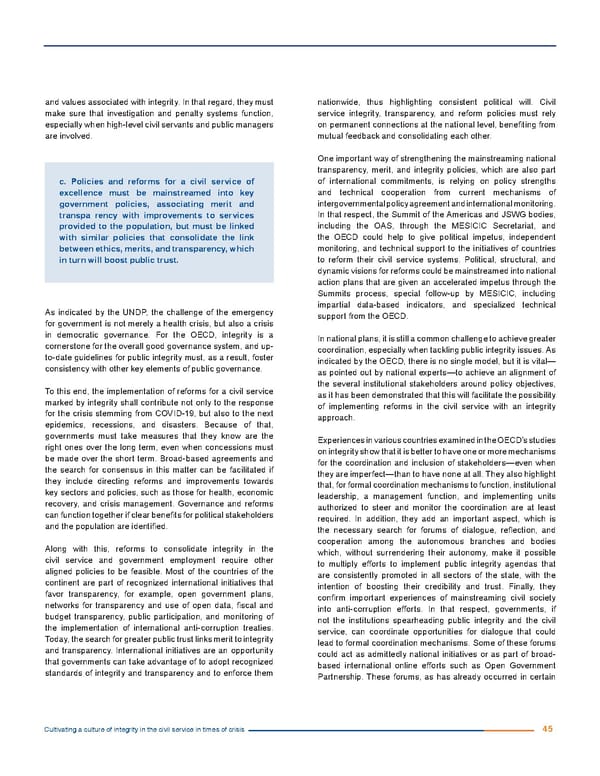and values associated with integrity. In that regard, they must nationwide, thus highlighting consistent political will. Civil make sure that investigation and penalty systems function, service integrity, transparency, and reform policies must rely especially when high-level civil servants and public managers on permanent connections at the national level, benefiting from are involved. mutual feedback and consolidating each other. One important way of strengthening the mainstreaming national transparency, merit, and integrity policies, which are also part c. Policies and reforms for a civil service of of international commitments, is relying on policy strengths excellence must be mainstreamed into key and technical cooperation from current mechanisms of government policies, associating merit and intergovernmental policy agreement and international monitoring. transpa rency with improvements to services In that respect, the Summit of the Americas and JSWG bodies, provided to the population, but must be linked including the OAS, through the MESICIC Secretariat, and with similar policies that consolidate the link the OECD could help to give political impetus, independent between ethics, merits, and transparency, which monitoring, and technical support to the initiatives of countries in turn will boost public trust. to reform their civil service systems. Political, structural, and dynamic visions for reforms could be mainstreamed into national action plans that are given an accelerated impetus through the Summits process, special follow-up by MESICIC, including As indicated by the UNDP, the challenge of the emergency impartial data-based indicators, and specialized technical for government is not merely a health crisis, but also a crisis support from the OECD. in democratic governance. For the OECD, integrity is a In national plans, it is still a common challenge to achieve greater cornerstone for the overall good governance system, and up- coordination, especially when tackling public integrity issues. As to-date guidelines for public integrity must, as a result, foster indicated by the OECD, there is no single model, but it is vital— consistency with other key elements of public governance. as pointed out by national experts—to achieve an alignment of To this end, the implementation of reforms for a civil service the several institutional stakeholders around policy objectives, marked by integrity shall contribute not only to the response as it has been demonstrated that this will facilitate the possibility for the crisis stemming from COVID-19, but also to the next of implementing reforms in the civil service with an integrity epidemics, recessions, and disasters. Because of that, approach. governments must take measures that they know are the Experiences in various countries examined in the OECD’s studies right ones over the long term, even when concessions must on integrity show that it is better to have one or more mechanisms be made over the short term. Broad-based agreements and for the coordination and inclusion of stakeholders—even when the search for consensus in this matter can be facilitated if they are imperfect—than to have none at all. They also highlight they include directing reforms and improvements towards that, for formal coordination mechanisms to function, institutional key sectors and policies, such as those for health, economic leadership, a management function, and implementing units recovery, and crisis management. Governance and reforms authorized to steer and monitor the coordination are at least can function together if clear benefits for political stakeholders required. In addition, they add an important aspect, which is and the population are identified. the necessary search for forums of dialogue, reflection, and Along with this, reforms to consolidate integrity in the cooperation among the autonomous branches and bodies civil service and government employment require other which, without surrendering their autonomy, make it possible aligned policies to be feasible. Most of the countries of the to multiply efforts to implement public integrity agendas that continent are part of recognized international initiatives that are consistently promoted in all sectors of the state, with the favor transparency, for example, open government plans, intention of boosting their credibility and trust. Finally, they networks for transparency and use of open data, fiscal and confirm important experiences of mainstreaming civil society budget transparency, public participation, and monitoring of into anti-corruption efforts. In that respect, governments, if the implementation of international anti-corruption treaties. not the institutions spearheading public integrity and the civil Today, the search for greater public trust links merit to integrity service, can coordinate opportunities for dialogue that could and transparency. International initiatives are an opportunity lead to formal coordination mechanisms. Some of these forums that governments can take advantage of to adopt recognized could act as admittedly national initiatives or as part of broad- standards of integrity and transparency and to enforce them based international online efforts such as Open Government Partnership. These forums, as has already occurred in certain Cultivating a culture of integrity in the civil service in times of crisis 45
 Cultivating a culture of integrity in the civil service in times of crisis. Page 52 Page 54
Cultivating a culture of integrity in the civil service in times of crisis. Page 52 Page 54